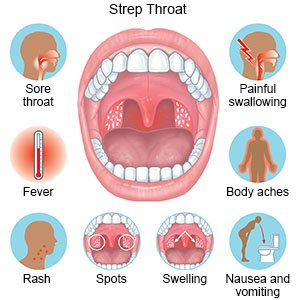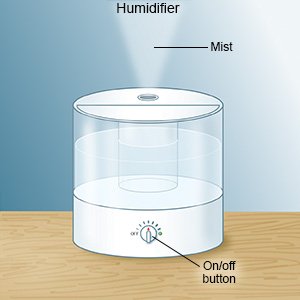Strep Throat in Children
Medically reviewed by Drugs.com. Last updated on Apr 6, 2025.
What is strep throat?
Strep throat is a throat infection caused by bacteria. It is easily spread from person to person.
What are the signs and symptoms of strep throat?
- Sore, red, and swollen throat
- Fever and headache
- Upset stomach, abdominal pain, or vomiting
- White or yellow patches or blisters in the back of the throat
- Throat pain when he or she swallows
- Tender, swollen lumps on the sides of the neck or jaw
 |
How is a strep throat diagnosed?
Your child's healthcare provider may swab the back of your child's throat to test for bacteria. You may get the results in minutes or the swab may be sent to a lab.
How is strep throat treated?
- Antibiotics treat a bacterial infection. Your child should feel better within 2 to 3 days after antibiotics are started. Give your child the antibiotics until they are gone, unless your child's healthcare provider says to stop them. Your child may return to school 24 hours after starting antibiotic medicine.
- Acetaminophen decreases pain and fever. It is available without a doctor's order. Ask how much to give your child and how often to give it. Follow directions. Read the labels of all other medicines your child uses to see if they also contain acetaminophen, or ask your child's doctor or pharmacist. Acetaminophen can cause liver damage if not taken correctly.
- NSAIDs , such as ibuprofen, help decrease swelling, pain, and fever. This medicine is available with or without a doctor's order. NSAIDs can cause stomach bleeding or kidney problems in certain people. If your child takes blood thinner medicine, always ask if NSAIDs are safe for him or her. Always read the medicine label and follow directions. Do not give these medicines to children younger than 6 months without direction from a healthcare provider.
- Do not give aspirin to children younger than 18 years. Your child could develop Reye syndrome if he or she has the flu or a fever and takes aspirin. Reye syndrome can cause life-threatening brain and liver damage. Check your child's medicine labels for aspirin or salicylates.
Treatment options
The following list of medications are related to or used in the treatment of this condition.
Drugs used to treat this and similar conditions
Penicillin VK
Penicillin VK is used for bacterial infection, clostridioides difficile infection, cutaneous ...
Bicillin L-A
Bicillin L-A is used for bacterial infection, congenital syphilis, glomerulonephritis ...
Ozempic
Learn about Ozempic (semaglutide) for type 2 diabetes treatment, weight management, cardiovascular ...
Bicillin C-R
Bicillin C-R is used for middle ear infections, pneumonia, skin or soft tissue infection ...
Pfizerpen
Pfizerpen is used for actinomycosis, anthrax, aspiration pneumonia, bacteremia, bacterial ...
Bicillin C-R 900/300
Bicillin C-R 900/300 is used for middle ear infections, pneumonia, skin or soft tissue infection ...
Penicillin g benzathine/procaine penicillin
Penicillin g benzathine/procaine penicillin systemic is used for middle ear infections, pneumonia ...
Penicillin g sodium
Penicillin g sodium systemic is used for actinomycosis, anthrax, aspiration pneumonia, bacteremia ...
Penicillin g potassium
Penicillin g potassium systemic is used for actinomycosis, anthrax, aspiration pneumonia ...
Penicillin g benzathine
Penicillin g benzathine systemic is used for bacterial infection, bejel, congenital syphilis ...
How can I manage my child's symptoms?
- Give your child throat lozenges or hard candy to suck on. Lozenges and hard candy can help decrease throat pain. Do not give lozenges or hard candy to children younger than 4 years.
- Give your child plenty of liquids. Liquids will help soothe your child's throat. Ask your child's healthcare provider how much liquid to give your child each day. Give your child warm or frozen liquids. Warm liquids include hot chocolate, tea, or soup. Frozen liquids include ice pops. Do not give your child acidic drinks such as orange juice, grapefruit juice, or lemonade. Acidic drinks can make your child's throat pain worse.
- Have your child gargle with salt water. Your child will need to be able to gargle without swallowing the salt water. Put ¼ teaspoon of salt in 1 cup of warm water. Tell your child to gargle for 10 to 15 seconds and then spit out the water. Your child can gargle up to 4 times each day.
- Use a cool mist humidifier in your child's bedroom. A cool mist humidifier increases moisture in the air. This may decrease dryness and pain in your child's throat.

How can I help prevent strep throat?
- Wash your hands and your child's hands often. Use soap and water. You may use an alcohol-based hand sanitizer if soap and water are not available.

- Do not let your child share food or drinks. Strep bacteria can stay on dishes and in straws for 24 hours or longer. Your child may pass the bacteria to others by sharing.
- Replace your child's toothbrush 24 hours after antibiotics are started. Strep bacteria can stay on a toothbrush for several days. Your child may get strep throat again or infect someone else if the toothbrush is not replaced.
Call your local emergency number (911 in the US) if:
- Your child has trouble breathing.
When should I seek immediate care?
- Your child's signs and symptoms continue for more than 5 to 7 days.
- Your child is tugging at his or her ears or has ear pain.
- Your child is drooling because he or she cannot swallow.
- Your child has blue lips or fingernails.
When should I call my child's doctor?
- Your child has a fever.
- Your child has a rash that is itchy or swollen.
- Your child's signs and symptoms get worse or do not get better, even after medicine.
- You have questions or concerns about your child's condition or care.
Care Agreement
You have the right to help plan your child's care. Learn about your child's health condition and how it may be treated. Discuss treatment options with your child's healthcare providers to decide what care you want for your child. The above information is an educational aid only. It is not intended as medical advice for individual conditions or treatments. Talk to your doctor, nurse or pharmacist before following any medical regimen to see if it is safe and effective for you.© Copyright Merative 2025 Information is for End User's use only and may not be sold, redistributed or otherwise used for commercial purposes.
Learn more about Strep Throat
- Antibiotics 101: Common Names, Types & Their Uses
- Can You Drink Alcohol with Antibiotics?
- Common Side Effects from Antibiotics, and Allergies and Reactions
Treatment options
Care guides
Symptoms and treatments
Medicine.com guides (external)
Further information
Always consult your healthcare provider to ensure the information displayed on this page applies to your personal circumstances.
